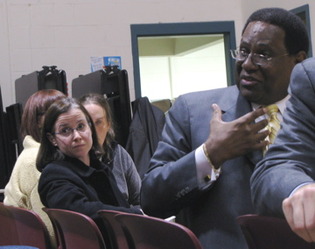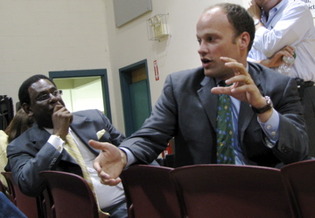 City officials heard that message as they took their school reform road show to Westville.
City officials heard that message as they took their school reform road show to Westville.
The message was not surprising, given the setting: The discussion took place at Edgewood School, which is often held up as a model of parental involvement.
About 60 people, including many parents, filed into the school gymnasium Thursday night to hear a presentation from Mayor John DeStefano, schools Superintendent Reggie Mayo (pictured) and Assistant Superintendent Garth Harries. The trio was making another stop on a citywide tour to pitch their ambitious school reform drive, which aims to close the city’s achievement gap by 2015 and ensure every student has the opportunity to go to college. The initiative has four planks: grading (and possibly closing and reconstituting some) schools; differentiated management of schools; attracting and recruiting talented staff; and a “Promise” college scholarship program for all city schoolchildren who do their course work.
Westville neighbors listened to the talk, then asked a question about what they called a missing link: Parents.
Their question had two parts: What role can active parents take in the school reform drive? And how will the schools encourage non-active parents to step up?
School reform plans call for schools to be “graded” and placed into three tiers. Tier 1 schools would be given more autonomy. Bottom-tier schools would eventually be closed and reconstituted if they don’t improve, according to the plans. The reforms also aim to include more accountability for teachers and principals, including firing those who fail to boost student performance.
“This is a lot of pressure” on teachers and staff, one woman in the audience noted.
“What can we do to make parents more involved?” the woman asked. “That is, like, number one!”
 Harries (at right in photo with Mayo), who recently left a top post at the New York City school system to oversee New Haven’s reforms, offered a response.
Harries (at right in photo with Mayo), who recently left a top post at the New York City school system to oversee New Haven’s reforms, offered a response.
The school system has a moral imperative to hold the same expectations for all students, regardless of how involved their parents are, Harries said.
That wasn’t enough for the young mom. She suggested parents sign a contract to commit to their child’s education.
“There has to be something compulsory,” the woman said. “We have to make them do this.”
Parent Plan “Incomplete”
Mayor DeStefano stepped up to the mic. Getting parents involved with their kids’ education—for example, by reading to them, making sure they do homework, attending parent-teacher conferences—has long been a struggle in New Haven, he said. The city has not yet figured out a solution.
Parents’ role in the school reform plan has yet to be determined, the mayor added.
“It’s an incomplete and imperfect part of this discussion,” he said.
Someone asked Harries how New York deals with parents who don’t get involved. “We can’t be alone” in this problem, the woman argued.
Harries said there’s no easy solution. “In every district I’ve seen, this has been a perpetual struggle,” he said.
DeStefano encouraged parents to be part of the discussion as the city seeks to flesh out their role in school reform. He encouraged them to attend school board meetings. The role of the school board will evolve to incorporate these reforms, he said, and he expects transparent conversations to take place.
Above all, DeStefano urged parents to get involved at the school level.
New Haven has 47 public schools. Each will evolve in a different way over the course of the reforms, DeStefano said. The goal is to make each school successful, rather than have a district with some shining stars that balance out the average.
The eventual goal: To close the achievement gap between New Haven test scores and the state average by 2015. To do that, the city will have to double the performance of minority students at the high-school level, officials said.
How would Edgewood, one of those top-performing schools, be affected?
Some people in the crowd said they’re concerned that with the new focus on the achievement gap, resources would be “diverted” to lower-performing schools.
“What is our guarantee that there will continue to be support” for high-performing students at schools like Edgewood? one person asked.
DeStefano said the city’s job is “to deliver resources to all schools.” He added that Edgewood won’t necessarily be a Tier 1 school, because the rankings will be based on student improvement, not just test scores. Resources will be devoted to making sure students at each school are improving, he said.
The Money Question
Westvile Alderwoman Ina Silverman, who hosted the event, kicked off a Q&A lively session with a question she said was probably on a lot of people’s minds: How are you going to pay for this?
The mayor said he expects to get help from federal stimulus grants and private philanthropists. That said, he noted that the Board of Ed has a $92 million payroll, with workers poised to get a 3 percent raise. The raise alone will amount to a $2.7 million increase that comes from taxpayer money. He said he does not expect to add more central office staff due to the reforms, but he couldn’t promise there would be no tax hike.
“Your taxes may go up because of some of this,” DeStefano said. “If I have to stand up for a tax increase for this, I’m willing to do that.”
Some previous stories about New Haven’s school reform drive:
• Teachers, City Reach Tentative Pact
• Philanthropists Join School Reform Drive
• Wanted: Great Teachers
• “Class of 2026” Gets Started
• Principal Keeps School On The Move
• With National Push, Reform Talks Advance
• Nice New School! Now Do Your Homework
• Mayo Unveils Discipline Plan
• Mayor Launches “School Change” Campaign
• Reform Drive Snags “New Teacher” Team
• Can He Work School Reform Magic?
• Some Parental Non-Involvement Is OK, Too
• Mayor: Close Failing Schools
• Union Chief: Don’t Blame The Teachers
• 3-Tiered School Reform Comes Into Focus
• At NAACP, Mayo Outlines School Reform
• Post Created To Bring In School Reform
• Board of Ed Assembles Legal Team